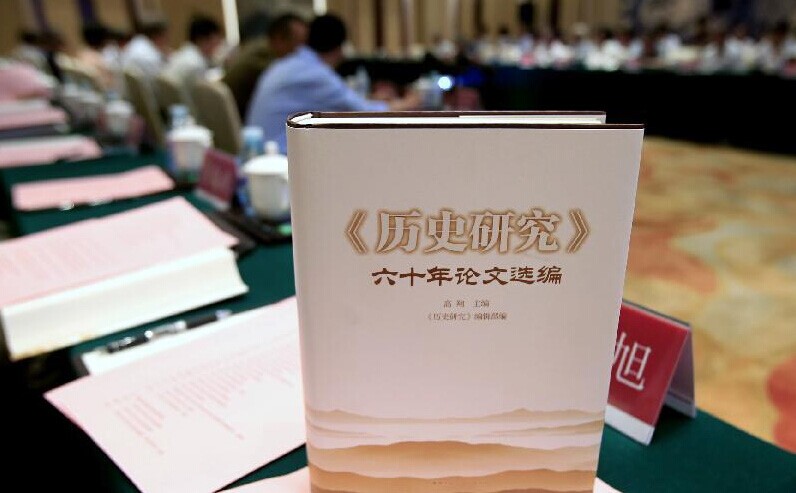Historical Research nurtures young scholars

Xinhua
In 1954, Historical Research, a national journal of historiography, was launched its first edition in China. Mao Zedong defined its mission as "letting a hundred schools contend." Over the past six decades, Historical Research has made a significant contribution to leading contemporary Chinese historiography and spreading excellent national culture.
On July 8, the Symposium on the 60th Anniversary of Historical Research and the First Forum of Young Historians took place in Beijing. Wang Weiguang, president and secretary of the Party Group of the Chinese Academy of Social Sciences (CASS) attended the conference and delivered an important speech. Gao Xiang, secretary-general and member of the Party Group of CASS, editor-in-chief of Social Sciences in China Press (SSCP), and director of the editorial board of Historical Research, chaired the conference and gave the welcome remark.
Historical materialism as guidance
"Historical Research is a renowned journal of historiography launched with Mao Zedong’s blessing. Over the past 60 years, the journal has always been guided by historical materialism, making significant contributions to passing down Chinese civilization, enhancing academic prosperity and promoting social progress," asserted Wang Weiguang, who extended his congratulations to the journal’s editorial department and historians all over the nation on behalf of the Party Group of CASS.
Standing at a new historical point, President Xi Jingping called for learning and gaining wisdom from historical lessons. After reviewing Xi's important statements on studying history, Wang stressed that the key to studying and researching history is mastering the basic principles and methodology of historical materialism.
Gao Xiang expressed sincere gratitude to the many historians who have supported and helped Historical Research on behalf of the journal’s editorial department and editorial board.
What we have learned from its past 60 years, Gao said, is that historical materialism is the banner and soul of contemporary Chinese historiography, that the exploration of historical laws has been the essential pursuit of historiography since the founding of New China.
Correlation between history and reality
Attendees to the conference focused on promoting historical research and interpreting the China Road and Chinese Dream by understanding historical rules.
"The important statements of Xi Jinping have elevated historical study to a new level. We must conduct careful and profound research on the history of our nation and of the Party, using the past to illuminate the present and cultivate people. This is an important mission that the times has given to historians," said Jin Chongji, former executive deputy director of the CPC Party Literature Research Office and former director of the Association of Chinese Historians.
Zhang Donggang, director of the Social Science Research Department at the Ministry of Education, noted that Historical Research has made great contributions to facilitating Chinese historiography and historical education, serving as a good friend and teacher of scholars and those who love history. History is the best textbook, and Historical Research is a milestone in Chinese academia leading Chinese historiography. Zhang expressed the hope that the journal would take historiography from the ivory tower to the field, making it more in touch with people’s daily lives.
60 years ago, in his editor’s statement for launching the journal, Guo Moruo commented on the internal correlations between history and reality, emphasizing that reality needs history, and history must meet with the requirements of reality. While Chinese society and historiography have seen tremendous change over the 60 years and we are now standing at a new historical point for the nation’s rejuvenation, some participants said, the article by Guo still has theoretical and realistic significance.
Young historians as new force
Attendees also hailed the leading role of Historical Research among its kind in China. A good journal should advocate the combination of empirical and theoretical research, encourage research with substantial verification and distinctive views and promote comparative studies, some said.
Young scholars are an important force for academic innovation. Historical Research has provided a platform for young scholars to show their talent and achievements.
"Pearls are everywhere but not the eyes. I do hope Historical Research will discover and nurture more young talent and make greater contributions to historiography," said Liu Yuan, a fellow from the Institute of History at CASS.
Young historians' presentations at the forum have not only demonstrated their understanding of historical facts, concepts and materials as well as historical values, but also reflected an expansion into various fields like politics, economics, society, thought and culture.
At the panel discussion with young historians, Gao Xiang pointed to a lack of theoretical originality in the humanities and social sciences, the tendency to use literary, Westernized and classical language in historical narratives as well as disciplinary barriers and fragmentation. He hoped that the forum can be built into an academic community for young scholars with all efforts.
Organized by the editorial department of Historical Research at SSCP, the conference was attended by more than eighty experts, discussing two themes "history is the best textbook" and "cutting-edge topics and trends in contemporary historiography". Attendees included renowned historians, such as Jin Chongji, Tian Jujian, Chen Xuewei and Qu Lindong.
The Chinese version appeared in Chinese Social Sciences Today, NO.618, July 9.
Translated by Jiang Hong
Chinese link:
http://sscp.cssn.cn/xkpd/zxtj/201407/t20140709_1245811.html

 PRINT
PRINT CLOSE
CLOSE